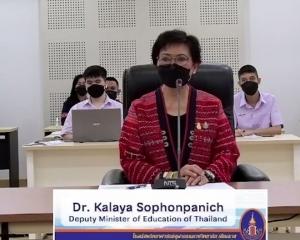The skyrocketing number of physical and verbal assaults on teachers and pupils in New Zealand schools is driving more than a third of graduate teachers out of the education sector, and the New Zealand Principals Federation is calling on politicians to help tackle the problem.
NZPF president Paddy Ford said 35% of New Zealand teaching graduates did not move on to full registration with the New Zealand Teachers Council after two years in the classroom, because they felt intimidated and frustrated in their job.
The statistic was highlighted by the Teachers Council during a presentation to the New Zealand Schools Consultative Group - a meeting of education sector organisations.
"It's deeply worrying. Teachers come to school to teach but they end up having to deal with behavioural issues. That puts a lot of them off the job. You can't teach properly if you've got pupils disrupting classes - that disrupts everyone's education."
Mr Ford said disruptive behaviour was one of several things putting stress on teachers but it was "the top concern" for principals, followed by worries about operations funding, professional development for principals, Ministry of Education compliance, and special needs funding.
He believed more than 10% of pupils nationwide gave regular displays of disruptive behaviour in the classroom, ranging from swearing at the teacher to physically assaulting the teacher and other pupils.
"Otago schools would be around that average," he said.
"Ten years ago, it would have been unheard of for pupils to threaten another pupil with a knife, and it was a very rare occurrence if a pupil physically threatened a teacher. But now it's becoming commonplace."
Part of the problem was teachers did not receive enough training at college in how to deal with disruptive children, he said.
"Most graduates have a 'tutor teacher' to help them with classroom management when they start working in their first school."
University of Otago College of Education secondary programmes director Gaynor Corkery disagreed with Mr Ford's belief more could be done to teach classroom management at teachers college.
"You learn classroom behaviour by being in a classroom doing it. We can give strategies to prepare for eventualities, but not every eventuality. We have to be careful to stay positive and not put people off the profession."
Ms Corkery was not concerned about the statistic because she believed two years into a teaching career many teachers were of the age where they were ready to go on their overseas excursion.
"Although we lose them after two years, they generally come back. Providing they do come back and register, we think an OE is invaluable because it gives them experience.
"It gives them an awareness of the diversity of pupils they teach and gives them good behaviour management strategies."
Colleges of education did not keep statistics on how many teachers returned and registered, but it would be useful to do so, she said.
"We want to hear from politicians about what they propose to do about the problem," Mr Ford said.
He said principals wanted more funding for social workers in schools to help whole families rather than just individual pupils.
"It's a community-wide problem, not just a school problem."











